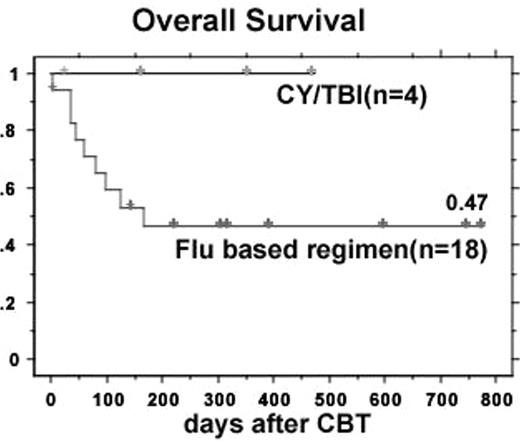Abstract
Backgrounds: Adult acute lymphoblastic leukemia (ALL) has poor prognosis despite intensive chemotherapy. Allogeneic hematopoietic stem cell transplantation is an optimal therapeutic strategy in relapsed ALL patients. HLA-matched unrelated donation is difficult in some cases because of the rapid disease progression. Cord blood transplantation (CBT) excells other measures in its availability, render it particularly effective in urgent situations; however, the outcome of CBT for adult ALL cases has not yet been clarified.
Patients/Methods: We reviewed medical records of 22 adult ALL patients who received CBT at Toranomon Hospital between January 2002 and June 2005. Median age of the patients was 54.5 (range 18–68). Disease status were CR1 (n=4), CR2 (n=3), RL1 (n=8), RL2 (n=1) and primary induction failure (n=6), respectively. 18 patients recieved fludarabine based regimen and the other received CY/TBI myeloablative regimen. Fludarabine based conditioning regimen was consisted of fludarabine (125 mg/m2), melphalan (80–140 mg/m2) and TBI (4–8Gy). GVHD prophylaxis was cyclosporine (n=12) or tacrolimus (n=10). Median total nucleated cell and CD34+ cell counts were 2.6×106 cells/kg (1.6–4.4) and 0.7×105 cells/kg (0.2–3.2), respectively. HLA disparity was 5/6 (n=1), 4/6 (n=20) and 3/6 (n=1).
Results: The probability of disease free survival at 2 years was 59%. Overall survival curves of each conditioning regimen were depicted as below.
Half of the relapsed/refractory ALL patients achieved complete remission and remained disease free after CBT.
Discussion: Adult ALL patients without any suitable donor should be considered as a candidate for CBT.
Author notes
Corresponding author


This feature is available to Subscribers Only
Sign In or Create an Account Close Modal